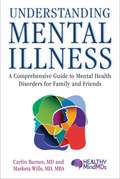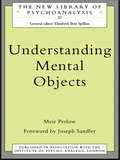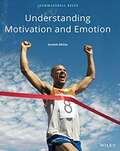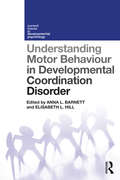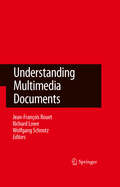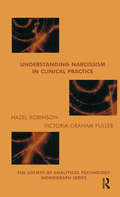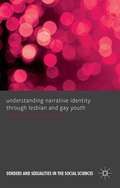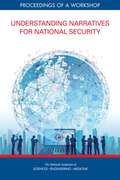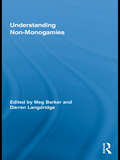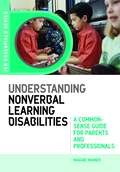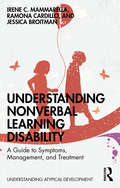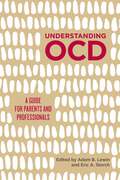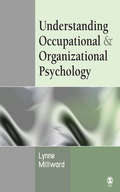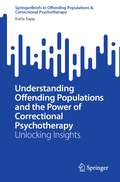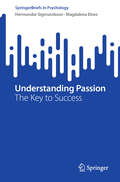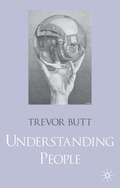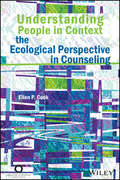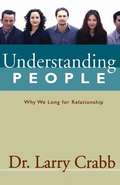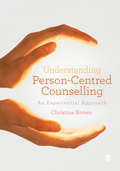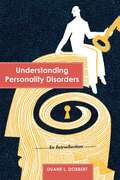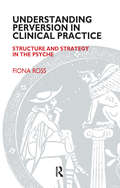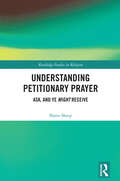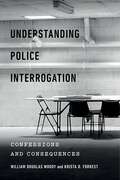- Table View
- List View
Understanding Mental Illness: A Comprehensive Guide to Mental Health Disorders for Family and Friends
by Carlin Barnes Marketa WillsGet the straight facts about mental illness from two Harvard trained psychiatrists. More than 40 million people in the US suffer from mental health problems—yet less than half receive adequate care and treatment. Even in the 21st century with the most advanced medical care in the world, social stigma still surrounds psychiatric problems, and this, combined with a lack of understanding, perpetuates a national mental health crisis affecting those in need and their families. Ignoring and/or being unaware of a problem can have devastating effects in our families and for society at large—many people living with mental illness go untreated, and as a result, people with untreated mental illnesses make up one third of the nation’s homeless population and can be imprisoned. To meet these challenges, Dr. Carlin Barnes and Dr. Marketa Wills have written this necessary and comprehensive, practical guide to educate and help everyone better understand mental health. Each chapter offers insights and wisdom concerning a variety of psychiatric conditions, including: Mood disordersAnxiety disordersPersonality disordersSubstance abuse issuesEating disordersWomen’s mental health issuesSuicide in AmericaGeriatric mental healthProfessional athletes and mental healthAnd more Armed with this knowledge, you and your loved one can better appreciate the real struggles at hand, and as a result, seek the proper care needed.
Understanding Mental Objects (The New Library of Psychoanalysis #Vol. 22)
by Meir PerlowThe ways in which an individual (the subject) relates to and perceives other people (his or her 'objects') has always been a preoccupation of psychoanalysis and in recent years a plethora of concepts has grown up in the literature. In this ground-breaking study, Meir Perlow sets out to clarify the changing meanings of the different concepts from context to context, discussing in depth the theoretical issues underlying them. The book begins with an historical survey of how mental objects have been understood in the various 'schools' of psychoanalysis as they have developed. These include Freud and his associates, the object-relations approaches of Klein, Fairbairn and Bion, orientations derived from ego psychology such as those of Schafer and Kernberg, and the self orientation of Winnicott and Kohut. In Part Two the author discusses the conceptual and clinical issues involved in the major differences between the concepts. Finally, in Part Three he delineates three basic meanings of the concepts of mental objects as they have emerged in the literature and shows how they are related to ongoing issues in contemporary psychoanalysis. This long overdue clarification of a complex area, with its wide ranging and imaginative grasp of the different theories about objects, will be an invaluable reference for all psychoanalysts and psychologists.
Understanding Motivation and Emotion
by Johnmarshall ReeveThe past ten years have seen an explosion of useful research surrounding human motivation and emotion; new insights allow researchers to answer the perennial questions, including "What do people want?" and "Why do they want what they want?" By delving into the roots of motivation, the emotional processes at work, and the impacts on learning, performance, and well-being, this book provides a toolbox of practical interventions and approaches for use in a wide variety of settings. <p><p> In the midst of the field's "golden age," there has never been a better time to merge new understanding and practical application to improve people’s lives. Useful in schools, the workplace, clinical settings, health care, sports, industry, business, and even interpersonal relationships, these concepts are profoundly powerful; incorporated into the state-of-the-art intervention programs detailed here, they can enhance people's motivation, emotion, and outlook while answering the core questions of any human interaction.
Understanding Motor Behaviour in Developmental Coordination Disorder (Current Issues in Developmental Psychology)
by Anna Barnett Elisabeth HillAlthough Developmental Coordination Disorder (DCD, sometimes referred to as ‘Dyspraxia’) has received less attention than other developmental disorders, its impact can be severe and long-lasting. This volume takes a unique approach, pairing companion chapters from international experts in motor behaviour with experts in DCD. Current understanding of the motor aspects of DCD are thus considered in the context of general motor behaviour research. Understanding Motor Behaviour in Developmental Coordination Disorder offers an overview of theoretical and methodological issues relating to motor development, motor control and skill acquisition, genetics, physical education and occupational therapy. Critically, Barnett and Hill ground DCD research within what is known about motor behaviour and typical development, allowing readers to evaluate the nature and extent of work on DCD and to identify areas for future research. This unique approach makes the book invaluable for students in developmental psychology, clinical psychology, movement science, physiotherapy, physical education, and special education, as well as researchers and professionals working in those fields.
Understanding Multimedia Documents
by Richard Lowe Jean-Francois Rouet Wolfgang SchnotzProfessionals who use multimedia documents as a tool to communicate concepts will find this a hugely illuminating text. It provides a comprehensive and up to date account of relevant research issues, methodologies and results in the area of multimedia comprehension. More specifically, the book draws connections between cognitive research, instructional strategies and design methodologies. It includes theoretical reviews, discussions of research techniques, ad original experimental contributions. The book highlights essential aspects of current theories, and trends for future research on the use of multimedia documents.
Understanding Narcissism in Clinical Practice (The Society of Analytical Psychology Monograph Series)
by Victoria Graham-Fuller Hazel RobinsonUnderstanding Narcissism in Clinical Practice is a new volume in the eagerly anticipated clinical practice monograph series from the Society of Analytical Psychology. Aimed primarily at trainees on psychotherapy and psychodynamic counselling courses, these compact editions will be invaluable to all who wish to learn the basics of major psychoanalytic theories from an integrated viewpoint. The authors are Jungian analysts trained at the SAP; highly experienced in both theory and practice. Narcissism is one of the most important contributions of psychoanalysis, as well as one of the most confusing. This monograph presents the clinical condition of narcissistic disorder in a clear, concise and easy-to-read style. The myth of Narcissus, from where the term 'narcissism' originates, is presented and discussed. Several brief case studies, plus one in-depth, illustrate the manifestations of narcissistic disorder that are detailed throughout.
Understanding Narrative Identity Through Lesbian and Gay Youth
by Edmund Coleman-FountainThis book contests the idea that lesbian and gay categories are disappearing, and that sexuality is becoming fluid, by showing how young people use them in a world in which heterosexuality is privileged. Exploring identity making, the book shows how old modernist stories of sexual being entwine with narratives of normality.
Understanding Narratives for National Security: Proceedings Of A Workshop
by Engineering Medicine National Academies of SciencesBeginning in October 2017, the National Academies of Sciences, Engineering, and Medicine organized a set of workshops designed to gather information for the Decadal Survey of Social and Behavioral Sciences for Applications to National Security. The sixth workshop focused on understanding narratives for national security purposes, and this publication summarizes the presentations and discussions from this workshop.
Understanding National Identity
by McCrone, David and Bechhofer, Frank David Mccrone Frank BechhoferWe live in a world in which being a 'citizen' of a state and being a 'national' are by no means the same. Amidst much scholarly debate about 'nations' and 'nationalism', comparatively little has been written explicitly on 'national identity' and a great deal less is solidly evidence-based. This book focuses on national identity in England and Scotland. Using data collected over twenty years it asks: does national identity really matter to people? How does 'national identity' differ from 'nationality' and having a passport? Are there particular people and places which have ambiguous or contested national identities? What happens if someone makes a claim to a national identity? On what basis do others accept or reject the claim? Does national identity have much internal substance, or is it simply about defending group boundaries? How does national identity relate to politics and constitutional change?
Understanding Neuropsychiatric Disorders: Insights from Neuroimaging
by Martha E. Shenton Bruce I. TuretskyAn informative and comprehensive review from the leading researchers in the field, this book provides a complete one-stop guide to neuroimaging techniques and their application to a wide range of neuropsychiatric disorders. For each disorder or group of disorders, separate chapters review the most up-to-date findings from structural imaging, functional imaging and/or molecular imaging. Each section ends with an overview from a internationally-renowned luminary in the field, addressing the question of 'What do we know and where are we going?' Richly illustrated throughout, each chapter includes a 'summary box', providing readers with explicit take-home messages. This is an essential resource for clinicians, researchers and trainees who want to learn how neuroimaging tools lead to new discoveries about brain and behaviour associations in neuropsychiatric disorders.
Understanding Non-Monogamies (Routledge Research in Gender and Society)
by Darren Langdridge Meg BarkerMost social scientific work on intimate relationships has assumed a monogamous structure, or has considered anything other than monogamy only in the context of 'infidelity'. Yet, in recent years there has been a growing interest among researchers and the public in exploring various patterns of intimacy that involve open non-monogamy. This volume gathers contributions from academics, activists, and practitioners throughout the world to explore non-monogamous relationships. Featuring both empirical and theoretical pieces, contributors examine the history and cultural basis of various forms of non-monogamy, experiences of non-monogamous living, psychological understandings of relationship patterns, language and emotion, the discursive construction of mono-normativity as well as issues of race, class, disability, sexuality and gender. This volume will be of interest to academics and practitioners working in the social sciences and anyone who is seeking greater insight into the intricacies of non-monogamous relationships.
Understanding Nonverbal Learning Disabilities: A Common-Sense Guide for Parents and Professionals
by Maggie MamenThis easy-to-read guide offers a complete overview of Nonverbal Learning Disabilities (NLDs) and the wide variety of symptoms that different types of NLD present. Maggie Mamen enables readers to select the most relevant strategies for coping with and managing their particular symptoms. She provides a wealth of practical advice on key skills such as developing written and verbal communication, understanding social clues, managing behaviour, self-regulation and improving organization. She also covers relevant teaching methods for the classroom. This practical and accessible introduction is an essential guide for those families and professionals working with children and adults with NLDs.
Understanding Nonverbal Learning Disability: A Guide to Symptoms, Management and Treatment (Understanding Atypical Development)
by Jessica Broitman Irene C. Mammarella Ramona CardilloThis essential book offers an accessible, evidence-based guide to Nonverbal Learning Disability (NVLD) informed by the most current research, and clinical and educational practice. It provides a thorough explanation of the science behind the condition, alongside ideas, support, and practical tips for managing the everyday challenges of the disorder at school and in family life. Mammarella, Cardillo, and Broitman describe the main characteristics of the condition from both theoretical and practical points of view, as well as examining the similarities and differences between NVLD and other neurodevelopmental disorders. They explore the cognitive and academic weaknesses and strengths of children with NVLD, and the emotional and social difficulties they may experience. The book also provides a systematic review of scientific studies in this field whilst focusing on issues of diagnostic criteria, as well as assessment and intervention strategies. Practical examples are given for teachers and parents to help support children with NVLD in improving their visuospatial and motor skills, as well as peer-social relations, and in promoting the child’s individual abilities. Understanding Nonverbal Learning Disability is essential reading for parents and practitioners in clinical and educational psychology, and health and social care, and students in these fields.
Understanding OCD: A Guide for Parents and Professionals
by Dean Mckay Eric A. Storch Adam B. Lewin Jennifer Park Brittany Rudy Caleb Lack Carly Johnco Gary Geffken Joseph Mcguire Joseph Mcnamara Lisa Bateman Marni Jacob Michael Sulkowski Robert SellesGiving a full overview of childhood obsessive compulsive disorder (OCD) and discussing all major treatment options, including cognitive behavioural therapy and medication, this guide provides the essential information that families, teachers, caregivers, clinicians and mental health professionals need in order to understand and treat childhood OCD. It covers origins, symptoms and related illnesses and explains how OCD is diagnosed. The book also suggests ways to maximise the outcomes of treatment, what to do when treatment doesn't work, and how to help manage OCD in children at school and in the home.
Understanding Occupational & Organizational Psychology
by Lynne Millward`This is a really useful and comprehensive textbook that will provide readers with all their needs as a primer in the field of occupational and organisational psychology' - Cary L Cooper, Times Higher Educational Supplement `Provides excellent coverage of the main areas of Industrial, Work and Organisational Psychology. All main topics at the individual an group levels are covered... a highly competent, research based introductory text' - Professor Neil Anderson, University of Amsterdam Understanding Occupational and Organizational Psychology is an invaluable resource for students doing a course in occupational and organizational psychology, either at third year undergraduate or Masters level. The text provides comprehensive coverage of the British Psychological Society's training requirements for becoming a chartered occupational psychologist, yet it is also compliant with European training guidelines for industrial, work and organizational psychology too. This book will prompt and inspire further reading and research as well as ideas for dissertations, problem formulation and the creative application of knowledge to various situations. Ideal if you want to get ahead with your undergraduate study or get your foot on the ladder to becoming a fully-fledged scientist-practitioner.
Understanding Offending Populations and the Power of Correctional Psychotherapy: Unlocking Insights (SpringerBriefs in Offending Populations & Correctional Psychotherapy)
by Karla SappThis book investigates the general correctional offender population and the psychotherapy services they receive. The offender population has long been considered the most difficult to engage in psychotherapy, often described as resistant, non-compliant, unworkable, and without feeling. This unique and culturally diverse population tend to find themselves, as a result, going through a cycle of arrest, conviction, incarceration, and release. Although other offender populations, such as female offenders, severe mentally ill, and sex offenders, have received considerable attention in scholarship, there has been little research focused on the treatment of the general offender population and how to reduce recidivism through the appropriate delivery of effective assessment and treatment services. This book will bridge that gap in literature, addressing: ● Who the offender population is ● Social and systematic factors they face ● Psychological understandings of criminal behavior ● Rehabilitation and psychotherapy theories and approaches to treatment , as well as best practices ● Future efforts in justice initiatives, advocacy, and public policy This book is best suited for upper-level undergraduates, graduate students and researchers, and practitioners in criminal justice fields and mental health professions working with offender populations.
Understanding Passion: The Key to Success (SpringerBriefs in Psychology)
by Hermundur Sigmundsson Magdalena ElnesThis book explores the concept of 'Passion' as a strong motivational force that can increase well-being and quality of life. The authors focus on the importance of having passion in various areas of life, to increase well-being, life satisfaction, and promote meaning in life. They go on to present how we can find and increase passion, supported by various psychological theories and research. Finally, the authors connect passion to expertise. They argue that it is essential to maintain passion during the process that leads to expertise, which is characterized as a long and demanding process that can be associated with negative consequences.
Understanding People
by Trevor ButtUnderstanding People provides an overview and critique of current psychological assumptions about people and what differentiates them, and replaces them with a set of ideas taken from social constructionism. It begins with an examination of contemporary theories, then explores the critique of the social constructionists, before laying out the basis of an understanding of human action and behaviour, drawing on phenomenology and personal construct theory. Using everyday experience to illustrate the issues in personality theory (Is behaviour situation-specific? Why do we have a sense of self? Is there an unconscious?), this book will breathe life into an area of psychology that is so often arid, and, in the eyes of students, divorced from their world.
Understanding People in Context: The Ecological Perspective in Counseling
by Ellen P. CookThis exceptional book emphasizes uniquely designed interventions for individual counseling, group work, and community counseling that consider clients as individuals within the contexts of families, cultural groups, workplaces, and communities. Part I describes the theoretical research base and major tenets of the ecological perspective and its applications to counseling practice. In Part II, experts who have used the ecological perspective in their work discuss its usefulness in various applications, including counseling diverse clients with specific life challenges; assessment, diagnosis, and treatment planning; and in schools, substance abuse programs, faith-based communities, and counselor training programs. *Requests for digital versions from ACA can be found on www.wiley.com. *To purchase print copies, please visit the ACA website *Reproduction requests for material from books published by ACA should be directed to permissions@counseling.org.
Understanding People: Why We Long For Relationships
by Larry CrabbExploring the link between the spiritual and psychological, Crabb offers a vital lens on who we really are and what makes us tick in our relationships with people, God, and with ourselves. In three parts, this book first points us to the Bible as our source of insight into perplexing heart issues. Then it helps us come to grips with our brokenness as God's image-bearers, and it shows how we can reclaim our ability to reflect him in our growth toward maturity and healed relationships.
Understanding Person-Centred Counselling: A Personal Journey
by Christine BrownThis book provides a key introduction to the theory, concepts and practice of the person-centred approach, through the lens of the practitioner's experience and personal development. Writing as someone who has been through real life challenges and has developed and learned as a result, the author's strikingly personal style not only helps to contextualise complex and nuanced theory, but makes this a truly unique book about real person-centred practice and experience. From Roger's early philosophy through to the current developments and controversies in the field, the author uses personal testimonies, exercises and reflection points to make challenging concepts and practice issues accessible for the novice reader. What results is an informative and fascinating read for all those training and interested in the person-centred approach.
Understanding Personality Disorders: An Introduction
by Duane L. DobbertPeople with personality disorders are all around us, though many times we're not aware of those who are overly paranoid, obsessive-compulsive, antisocial, or overly dependent until it's too late. Indeed, many sufferers aren't aware themselves of their disorders and often go undiagnosed and untreated, leading to problems in their personal and professional lives. Here, Dobbert offers an introduction to the most common personality disorders, and a guide for those who work, live, or come in contact with sufferers on a daily basis.
Understanding Perversion in Clinical Practice: Structure and Strategy in the Psyche (The Society of Analytical Psychology Monograph Series)
by Fiona RossUnderstanding Perversion in Clinical Practice is a volume in the eagerly anticipated clinical practice monograph series from the Society of Analytical Psychology. Aimed primarily at trainees on the psychotherapy and psychodynamic counselling courses, those compact editions will be invaluable to all who wish to learn the basics of major psychoanalytic theories from an integrated viewpoint. The authors are Jungian analysts trained at the SAP, highly experienced in both theory and practice. Perversion is a concept that defies simplistic classification. This monograph provides a comprehensive study of the nature of perversion and the therapeutic relationship needed for treatment. Case studies are used throughout to illustrate aspects of perversion and notable psychoanalytic theories are detailed for greater understanding of what perversion is and how it can be treated. Female perversion is explored in a separate chapter as the symptoms and underlying reasons are quite different from those in male perversion.This is a helpful and succinct exploration of perversion in its numerous manifestations that provides a firm foundation in the subject.
Understanding Petitionary Prayer: Ask, and Ye Might Receive (Routledge Studies in Religion)
by Shane SharpThis book explores the “whats,” “whys,” and “hows” of petitionary prayer. Millions of people every single day ask God or some other supernatural being to make some outcome or event happen, whether it be to keep their children safe during a road trip, to give them the willpower to avoid succumbing to the temptation of alcohol, or to help them find a job. The chapters in this volume draw on 130 in-depth interviews conducted in the United States, including non-Christian believers. The author provides extensive documentation and analyses of believers’ experiences and beliefs regarding petitionary prayer. He explores what outcomes believers feel they can legitimately seek through petitionary prayer, how people use petitionary prayer to persuade supernatural beings to make outcomes and events happen, why they believe petitionary prayer is actually effective, and why they believe their prayers went “unanswered.” Studying prayer in general and petitionary prayer in particular is an important part of describing and understanding people’s religious lives. The book will be of interest to scholars and students of religious studies, the sociology of religion, the psychology of religion, social psychology, and symbolic interactionism.
Understanding Police Interrogation: Confessions and Consequences (Psychology and Crime #4)
by William Douglas Woody Krista D. ForrestUses techniques from psychological science and legal theory to explore police interrogation in the United States Understanding Police Interrogation provides a single comprehensive source for understanding issues relating to police interrogation and confession. It sheds light on the range of factors that may influence the outcome of the interrogation of a suspect, which ones make it more likely that a person will confess, and which may also inadvertently lead to false confessions. There is a significant psychological component to police interrogations, as interrogators may try to build rapport with the suspect, or trick them into thinking there is evidence against them that does not exist. Also important is the extent to which the interrogator is convinced of the suspect’s guilt, a factor that has clear ramifications for today’s debates over treatment of black suspects and other people of color in the criminal justice system. The volume employs a totality of the circumstances approach, arguing that a number of integrated factors, such as the characteristics of the suspect, the characteristics of the interrogators, interrogation techniques and location, community perceptions of law enforcement, and expectations for jurors and judges, all contribute to the nature of interrogations and the outcomes and perceptions of the criminal justice system. The authors argue that by drawing on this approach we can better explain the likelihood of interrogation outcomes, including true and false confessions, and provide both scholars and practitioners with a greater understanding of best practices going forward.
